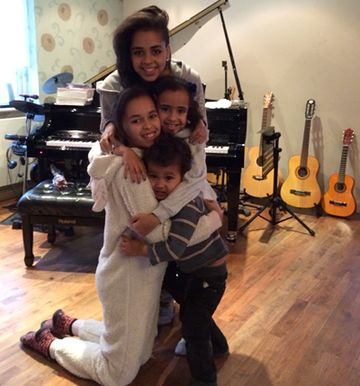Like every parent of children with special educational needs, today’s announcement by the government of £31m extra special needs (SEN) funding for local authorities gives me hope that things will improve. But, as yet, it’s unclear what the government’s reforms will mean for our family. We have four children with additional needs: our eldest, Olivia, 20, has attention deficit hyperactivity disorder (ADHD) and dyspraxia and is studying drama at university; Talia, 13, has Asperger’s and dyscalculia; Imogen, 8, has autism including Tourette’s; while our adopted son, who is five years old, has attachment difficulties.
We didn’t realise they had issues until they went to nursery. Imogen loved to crawl into small spaces and squeeze faces, Talia wouldn’t eat foods if they had touched each other, Olivia walked and wrote backwards and my son would break things and not join in sitting down.
At home, getting ready for school is the loudest and most stressful two hours of the day. The children are sometimes depressed, often troubled, melting down or needing to talk things through and always highly anxious about the day ahead. Both my husband and I have to be hypervigilant. Gone are our old parenting techniques of strong discipline and a one size fits all approach. Each child is treated according to their needs to bring about the best outcomes for them and for those around them. Most of the time it works, but not always and often it is a wrung-out wreck of a mum who turns up at the school gate to meet the SEN coordinator.
Even with a great SEN coordinator, I have had to learn to fight, trying to explain invisible disability to every member of staff who comes into contact with my children. All our girls have sensory challenges, so brightly lit, noisy, cluttered classrooms are a real challenge for them. Olivia’s attention will often drift, she fidgets constantly and also struggles with co-ordination. Talia is very compliant but won’t say if she doesn’t understand something. She is very anxious and needs someone in school to help her make sense of what may be going on around her. Imogen needs help and encouragement to focus and can have challenging behaviour. Her helpers need to understand and discern how and when she is struggling before a meltdown occurs. Our son needs to be handled very carefully when it comes to discipline. His background has led to him feeling acute shame, so teaching staff have to be aware of this while still maintaining boundaries.
The UK has come such a long way with understanding diversity but “different thinkers” are still yet to be heard or understood.Until everyone understands the invisible impairments our children have, the fight goes on. I am not alone, as Ofsted’s new report on councils’ progress so far on SEN shows.
I hope the extra funding will ensure councils fully implement one of the most positive aspects of the government’s reforms – the requirement that children and parents must be involved in decisions about how best to meet special needs. This is important because those with neurological conditions like my children until now have not always had their opinions listened to.
Imogen’s teacher this year has had no training in autism and had to research this herself. We hope the new legislation will lead to all schools and teachers having proper training. So far, the response from many schools and councils has been positive. What’s needed now is a change in schools’ attitudes to SEN to a culture which understands and celebrates those with different thought patterns and an appreciation that our children are not a burden but an asset.
Published in The Guardian 17/12/2014http://www.theguardian.com/society/2014/dec/17/special-educational-needs-new-funding-councils-listen-to-children-teachers-trained

